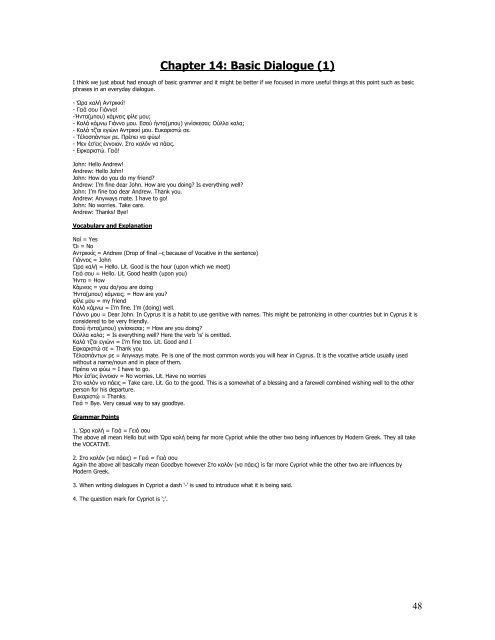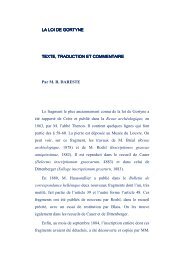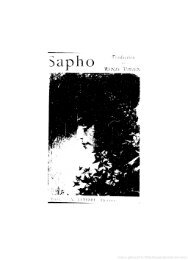CYPRIOT GRAMMAR
CYPRIOT GRAMMAR
CYPRIOT GRAMMAR
Create successful ePaper yourself
Turn your PDF publications into a flip-book with our unique Google optimized e-Paper software.
Chapter 14: Basic Dialogue (1)<br />
I think we just about had enough of basic grammar and it might be better if we focused in more useful things at this point such as basic<br />
phrases in an everyday dialogue.<br />
- Ώρα καλή Αντρικκί!<br />
- Γειά σου Γιάννο!<br />
-Ήντα(μπου) κάμνεις φίλε μου;<br />
- Καλά κάμνω Γιάννο μου. Εσού ήντα(μπου) γινίσκεσαι; Ούλλα καλα;<br />
- Καλά τζ’αι εγιώνι Αντρικκί μου. Ευκαριστώ σε.<br />
- Τέλοσπάντων ρε. Πρέπει να φύω!<br />
- Μεν έσ’εις έννοιαν. Στο καλόν να πάεις.<br />
- Εφκαριστώ. Γειά!<br />
John: Hello Andrew!<br />
Andrew: Hello John!<br />
John: How do you do my friend?<br />
Andrew: I’m fine dear John. How are you doing? Is everything well?<br />
John: I’m fine too dear Andrew. Thank you.<br />
Andrew: Anyways mate. I have to go!<br />
John: No worries. Take care.<br />
Andrew: Thanks! Bye!<br />
Vocabulary and Explanation<br />
Ναί = Yes<br />
Όι = No<br />
Αντρικκίς = Andrew (Drop of final –ς because of Vocative in the sentence)<br />
Γιάννος = John<br />
Ώρα καλή = Hello. Lit. Good is the hour (upon which we meet)<br />
Γειά σου = Hello. Lit. Good health (upon you)<br />
Ήντα = How<br />
Κάμνεις = you do/you are doing<br />
Ήντα(μπου) κάμνεις; = How are you?<br />
φίλε μου = my friend<br />
Καλά κάμνω = I’m fine. I’m (doing) well.<br />
Γιάννο μου = Dear John. In Cyprus it is a habit to use genitive with names. This might be patronizing in other countries but in Cyprus it is<br />
considered to be very friendly.<br />
Εσού ήντα(μπου) γινίσκεσαι; = How are you doing?<br />
Ούλλα καλα; = Is everything well? Here the verb ‘is’ is omitted.<br />
Καλά τζ’αι εγιώνι = I’m fine too. Lit. Good and I<br />
Εφκαριστώ σε = Thank you<br />
Τέλοσπάντων ρε = Anyways mate. Pe is one of the most common words you will hear in Cyprus. It is the vocative article usually used<br />
without a name/noun and in place of them.<br />
Πρέπει να φύω = I have to go.<br />
Μεν έσ’εις έννοιαν = No worries. Lit. Have no worries<br />
Στο καλόν να πάεις = Take care. Lit. Go to the good. This is a somewhat of a blessing and a farewell combined wishing well to the other<br />
person for his departure.<br />
Ευκαριστώ = Thanks.<br />
Γειά = Bye. Very casual way to say goodbye.<br />
Grammar Points<br />
1. Ώρα καλή = Γειά = Γειά σου<br />
The above all mean Hello but with Ώρα καλή being far more Cypriot while the other two being influences by Modern Greek. They all take<br />
the VOCATIVE.<br />
2. Στο καλόν (να πάεις) = Γειά = Γειά σου<br />
Again the above all basically mean Goodbye however Στο καλόν (να πάεις) is far more Cypriot while the other two are influences by<br />
Modern Greek.<br />
3. When writing dialogues in Cypriot a dash ‘-‘ is used to introduce what it is being said.<br />
4. The question mark for Cypriot is ‘;’.<br />
48





